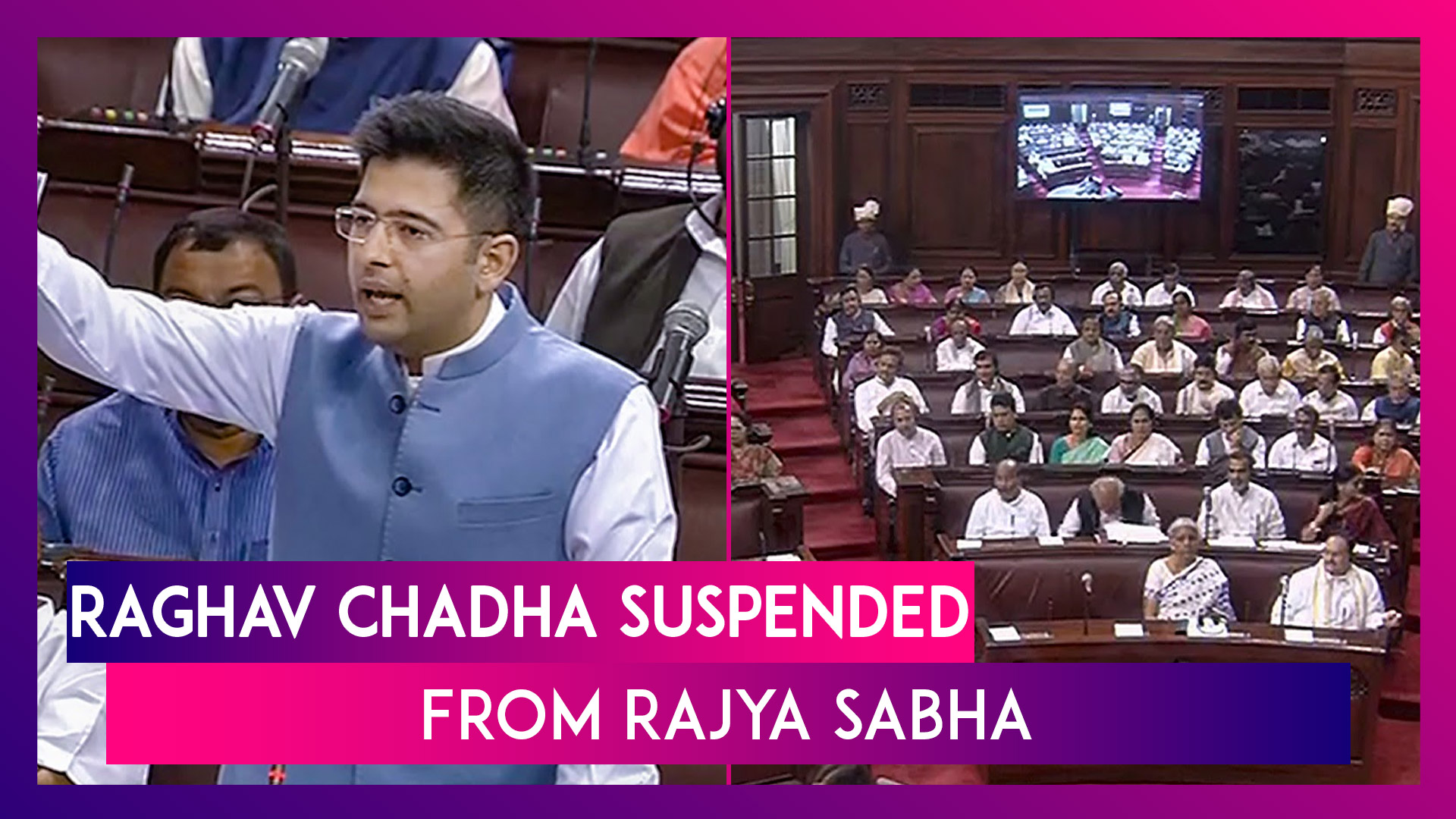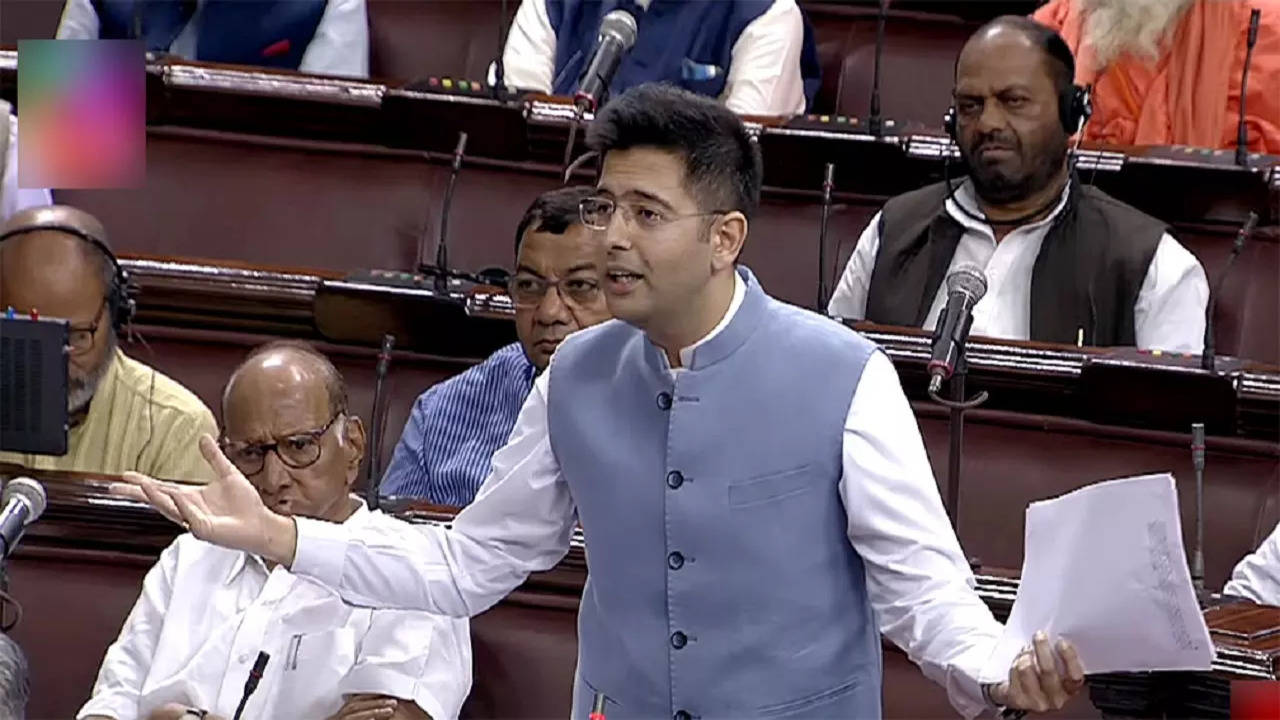AAP MP Raghav Chadha Suspended from Rajya Sabha- Another Opposition MP Targetted: Alleged Fake Propaganda by BJP
AAP MP Raghav Chadha has been suspended from Rajya Sabha over gross violation of rule and misconduct, he alleges fake propaganda by BJP behind all this.

AAP MP Raghav Chadha Suspended from Rajya Sabha- Another Opposition MP Out: Alleged Fake Propaganda by BJP
Raghav Chadha, an AAP member, was suspended from the Rajya Sabha on Friday due to alleged “gross misconduct” and “violation of rule.” This suspension is in effect till the Privileges Committee issues its findings. Chadha received a suspension a few days after four Rajya Sabha MPs — the BJD’s Sasmit Patra, BJP’s S Phangnon Konyak and Narhari Amin as well as the AIADMK’s M Thambidurai — objected about violation of their privileges, charging that their names were improperly included as part of an amendment advanced by Chadha looking for referral of the Government of National Capital Territory of Delhi (Amendment) Bill, 2023 towards a Select Committee devoid of their consent.
Raghav Chadha is accused of forging the signatures of five MPs in the move to refer the Delhi Services Bill to a select committee, according to allegations made by Union home minister Amit Shah on Monday. The AAP denied the accusation, claiming that since the MPs’ names must be provided instead of their signatures, there was no fraud involved. In “good faith,” the identities of the aforementioned five MPs were also provided.
This occurs just one day after Adhir Ranjan Chowdhury, a Congress member as well as the leader of the opposition in the Lok Sabha, had been removed for “repeated misconduct” while the privileges committee looked into the matter. Jagdeep Dhankhar, the chairman of the Rajya Sabha, had sent the matter against Chadha for investigation to the House’s Privileges Committee. After the House Leader, Piyush Goyal, presented a motion to take action against the AAP MP for inserting the names of the four MPs in a planned Select Committee for the NCT Bill, the MP was suspended.
Goyal accused the AAP MP of violating the members’ privileges, calling Chadha’s behavior “unethical,” “unexpected,” as well as unacceptable for a member of Parliament. By voice voting, the move to suspend him was approved. Furthermore, Sanjay Singh, an AAP member, has been suspended from the Upper House, and his suspension has been extended till the Privileges Committee rules on the complaints brought against him.
An investigation into the concerns of a minimum of four MPs that their names had been included in a Select Committee of the House to consider the NCT Bill without their assent, as recommended by Chadha, had been announced by Rajya Sabha Deputy Chairman Harivansh on Monday. Home Minister Amit Shah stated that five individuals had objected that their names had been included in the proposal made by the AAP leader without their signatures after Harivansh read out the names to be featured in the proposed Select Committee.
Shah urged that this matter be looked at right away. He claimed it was a violation of House privilege and that the Privileges Committee should be consulted. He said, “Who all have signed on their behalf is a subject of investigation,” and he asked the Chair to take down the complainant members’ remarks.
It seems at first glance to be a grave violation of the Rules as well as the dignity of the aggrieved Members because it is claimed that the assent of the aggrieved Members had never been acquired. The notification reporting the case to the Privileges Committee stated that such a trespass by a Member of the Council in the exclusive realm of other Members constitutes unethical and a major act of impropriety as well as misconduct.
Raghav Chadha is accused of violating the Rules by failing to obtain consent from the four Members. Members of the Council have the authority to move an amendment to a bill as well as consent to serve on a Select Committee. However, a Member exerting such discretion should not abuse the process by attempting to denigrate and dismiss similar prerogatives accessible to other Members, according to the notification. The Chairman has referred the subject to the Committee of Privileges for inspection, investigation, as well as report under Rule 203 of the Rules of Procedure and Conduct of Business in the Council of States (Rajya Sabha).

Manipur Ignored, Opposition Targeted
Despite a lengthy debate between the Treasury as well as the Opposition on the different rule positions within which it ought to have held, the Rajya Sabha failed to have a discussion on Manipur. The monsoon session concluded with the suspension of AAP member Raghav Chadha as well as the adoption of a motion that extended the suspension of AAP floor leader Sanjay Singh.
The opposition party shunned the post-lunch session because there was no hint of any discussion on Manipur. In their absence, Speaker Piyush Goyal introduced two separate moves aimed at suspending Mr. Chadha as well as to seek an extension of Mr. Singh’s suspension. Mr. Singh was suspended till the Monsoon Session ended. Mr. Dhankhar stated that the privileges committee would investigate both MPs’ wrongdoing and that they would be suspended until the House examined the panel’s reports. Mr. Goyal moved the motions, citing the “misconduct” of both MPs.
Several opposition lawmakers commented with fury to the Rajya Sabha’s suspension of Chadha. According to AAP MP Sanjay Singh, the decision was based on baseless allegations.
Instead of taking action in Manipur, they are targeting me. They extended my suspension going against the rules. I will continue to speak for Manipur and won’t get intimidated by such steps. Raghav Chadha has also been suspended over baseless allegations.
– AAP MP Sanjay Singh
Raghav Chadha strikes back
Raghav Chadha, an MP for the Aam Aadmi Party (AAP), described himself as a “suspended” Rajya Sabha member in an online video message and asked several questions about the decision made by the national government to exclude him from participating in the Upper House. He enquired as to whether his suspension was a result of, among other pertinent things, questioning the top members of the most powerful party in the entire globe inside the Parliament.
Am I guilty because I questioned the leaders of the biggest party in the world inside the Parliament or am I guilty because I put forth my point on Delhi Services bill and demanded justice from them?
Raghav Chadha denied the claims and stated that an MP can suggest a name for any committee’s formation without the person whose name is being suggested, his signature or written agreement. “Suppose I organise a birthday party and invite 10 people. Eight of them come, and two do not accept my invite. Instead, they charge me, ‘how dare you invite us to your birthday?’ This is what happened. I just invited them (MPs) to be part of the committee,” Raghav Chadha remarked.
Chadha has stood by himself, saying that it was merely a proposal for the purpose of which he failed to obtain the members’ signatures because doing so was not a prerequisite for creating a House panel. He has brushed off the accusations against him as fake propaganda of the BJP.
Mr. Chadha dismissed the accusations and claimed the reason the ruling party singled him out was due to the fact that it was unable to embrace that a 34-year-old MP challenged its most powerful figures. He pressed BJP leaders to produce any documentation showing that he had falsified anyone’s signature.
The call to action of the BJP, according to Chadha, is to repeat a lie numerous times until it is accepted as fact. This motto was followed, and a malicious campaign was started against him. He explained that this was the reason he needed to address the media and the general public for clearing out the air.
Mr. Chadha had stated, waving a red book outlining Rajya Sabha regulations, that no one’s signature or written agreement was required in order to suggest their name for a select committee. Every time a contentious bill is introduced in the House as well as a member wants it to be thoroughly debated before a vote, he suggests bringing it to a select committee. MPs’ names are put forward for this panel. Individuals who do not wish to be included on the committee can remove their names from consideration. How can it be fabricated if the document has no signature present? said Mr. Chadha.

Political Strategy of BJP
Healthy political dialogue as well as the productive exchange of ideas are essential to any democracy’s ability to run its affairs. As a key component of this ecosystem, the opposition has a huge impact on holding the ruling party responsible, promoting transparency, along with ultimately advancing the country. Recent events, however, have prompted questions about the direction politics is taking, with it appearing that the ruling party is engaging in a practice of dirty politics, sullying the names of opposition parties as well as leaders as opposed to solving urgent national issues.
The ability of all parties to participate in polite conversations and debates about issues of public interest is the cornerstone of a strong democracy. Unfortunately, the current setting has seen a change away from serious discussions and toward character assassination as well as personal attacks. It appears that the ruling party spends a significant amount of time and energy denigrating opposition leaders. This tactic not only diverts attention away from pressing issues that need to be addressed and resolved but also degrades the political discourse as a whole, undermining public confidence in their elected officials.
It is critical to keep in mind that a strong opposition serves as an essential check and balance system rather than as the opposition’s rival to the ruling party. It is important to consider the complaints and recommendations of opposition parties since they represent the views of a sizeable segment of the community. When the ruling party engages in character assassination as well as mudslinging, it not only damages the credibility of the opposition but affects the functioning of democracy.
Citizens are entitled to a government that prioritizes finding answers over theatricality in politics. Voters gave the ruling party their support in the hopes of advancement and favorable change. This trust is put to the test, though, when the ruling party decides to use strategies that diminish political discourse as well as downplay important present-day issues such as Manipur. The ruling party must proactively commit to pursuing a governance focused on tackling the problems confronting the nation as a whole and promoting growth while also appreciating the value of a strong opposition. Only by working together can a nation achieve true prosperity as well as fulfil its citizens’ desired goals.





